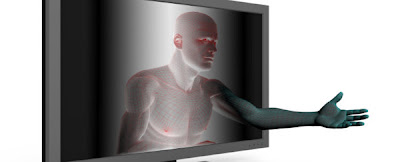| http://mobileobservation.files.wordpress.com/2011/10/03-arpanet-cain.jpg |
While disco music was hitting the airwaves, Vinton Cerf, later known as the "father of the internet," and researchers at Stanford University and UCLA were developing packet switching technology and transmission protocols that allowed the internet to function. in the 1980s, the National Science Foundation took on the task of designing a network that became the basis for the Internet, as it's know today. At the same time, a group of scientists in the European Laboratory of Particle Physics headed by Tim Berners-Lee was developing a system for the worldwide interconnectivity that was later known as the worldwide web. When the internet was first created its uses we limited and only certain people knew how to use it. to be connected to the internet you had to have a Ethernet cable connected to your PC. ( Norman J. Medoff & Barbra Kaye)
Now:
| http://ktv.vac.hu/uphirek/Internet.jpg |
Later: In the future I predict that we will somehow be able to literally surf the web. Our technology is rapidly advancing we already have phones that project holograms. I think we will be able to access the internet from anywhere at anytime and the government will always know where our location is. predict that we will have to
| http://img4.wikia.nocookie.net/__cb20110221031323/fairlyoddparents/en/images/b/b5/InformationStuporHighway96.png |
